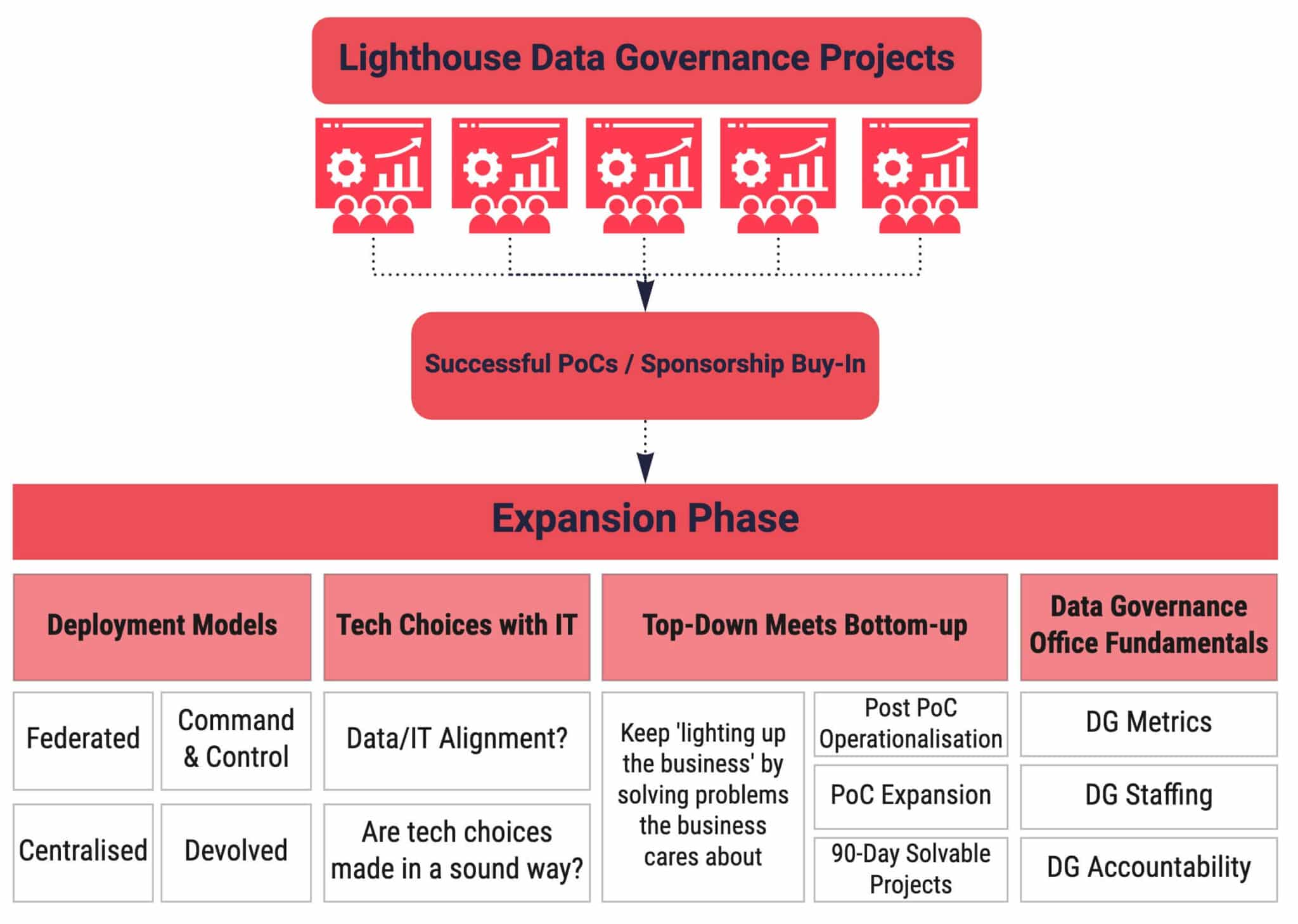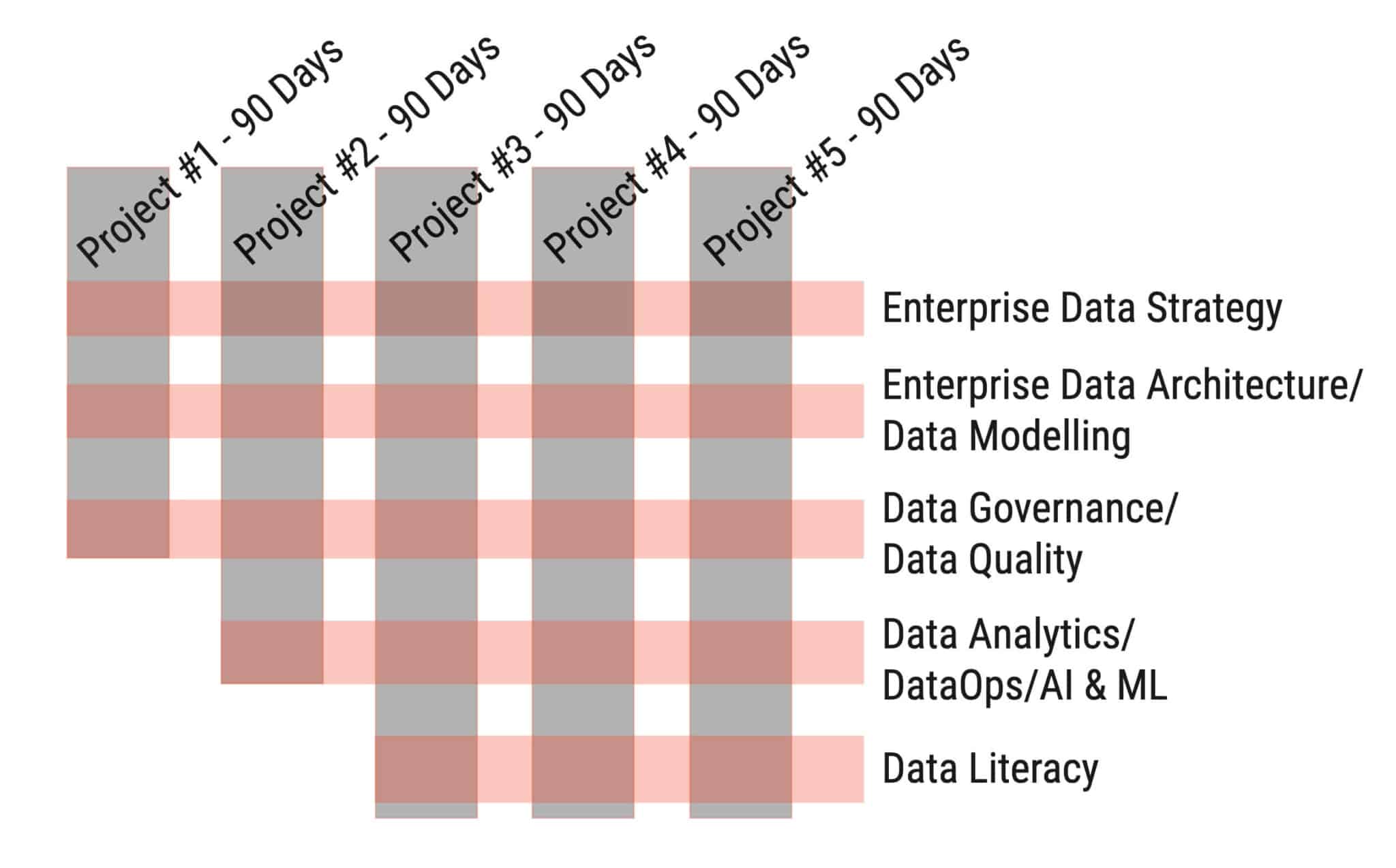In this post, we expand on our earlier focus on ‘How to Build a Data Governance Program by Stealth: Introducing the Lighthouse Projects Concept‘ by exploring how to expand the reach and impact of Data Governance through alignment with a robust data strategy.
Why the need for Lighthouse Data Governance?
In the earlier ‘Data Governance by Stealth‘ article, we outlined an Oakland technique called the ‘Lighthouse Project’ concept – a response to discovering that executives are usually reluctant to invest in large, all-encompassing data governance programs.
By rolling out a series of smaller, business outcomes-driven initiatives that create tangible value for the organisation, we help our clients’ bake in’ the data governance fundamentals as a side benefit of tactical data improvements and innovations.
Once you have some wins under your belt, you can shine a light on the benefits of data governance, data quality and other data-focused improvements, making it far more likely to build traction and momentum within executive circles for a broader data governance/data strategy program.
The Three Pillars of a Data Strategy and Data Governance Business Case
We found that deploying the Lighthouse Projects approach to data governance in this way creates a three-pillar approach to data strategy and governance business case development:
- Pillar 1: Limit the early investment – plan a modest level of expenditure, resisting the urge to build a ‘behemoth’ data strategy/governance program that attracts a lot of attention and a great deal of expectation.
- Pillar 2: Focus on value creation – deliver a series of tactical ‘Lighthouse Projects’ to create demonstrable value for the business. Tackle the most impactful data-related projects that align to drivers the business cares most deeply about right now.
- Pillar 3: Fly under the radar – gradually establish your data governance program by enabling activity in ‘stealth mode. Start to lock in the gains of each Lighthouse Project as you progress.
Aligning the Data Governance and Data Strategy Roadmap
One challenge you’re likely to face is the issue of alignment and deployment of a data strategy to extend your initial Lighthouse Projects into a full-blown data governance capability.
The following diagram highlights some of the essential considerations when expanding Lighthouse Projects into a broader data strategy and governance framework:

This approach relies on four vital building blocks for the longer term progress of your data strategy and governance roadmap:
Building Block #1: Set up a Business-Led Authority
In this phase, you will be establishing the ‘subordinate’ organisation required to manage the accountabilities for delivering the anticipated outcomes of your data governance initiative.
Key activities are setting up the coordination, assurance and ownership of data domains within each ‘directorate’ across the organisation.
In particular, you’ll need to train the business on what it means to be the accountable owner/steward of a data domain, particularly with data domains that span multiple departments and functions within the company.
Building Block #2: Establishing the ‘Controlling Mind’ for Data
As you deliver more Lighthouse Projects, you’ll develop the need for a ‘Controlling Mind’ to help coordinate and operationalise your ongoing data-related activities so that your data is treated as an asset.
For example, in order to retain the necessary skills, you’ll be looking to transition the required data capabilities as each Lighthouse Project is completed.
There are three specific requirements for building a ‘Controlling Mind’ and the required supporting capability:
- Setting the Direction: Defining a data/governance strategy and ensuring alignment with relevant strategic initiatives.
- Controlling/Assuring Data Assets: Managing the availability and quality of your data, including its integrity and security. Included in this step is the development of your core data governance processes, including relevant metrics and measurement of key behaviours.
- Building the Capability: Depending on the preferred deployment model (see diagram above), you will develop a Centre of Excellence, offering the necessary training and support foundations. A Data Governance CoE should drive the development of data expert communities and stewardship forums, made up of business and technical teams. Finally, the CoE would provide provisioning recommendations for data tooling and a constant monitoring to ensure data maturity is progressing in the right direction.
Building Block #3: Launching Data Management Enabling Projects
As each Lighthouse Project gets completed, you’ll find yourself iteratively building deeper foundations of data management capability, albeit fully aligned to business outcomes.
By taking the outcome-driven approach, you can advance data maturity and data capability one project at a time, but in alignment with any goals for your Data Capability Target Operating Model (ToM), Data Architecture, Technology Strategy and Enterprise Data Strategy.
Success depends on getting the business engaged and excited about the art of the possible as each ‘slice’ of data capability increases in maturity following each project win.
When the business experiences the positive change resulting from data, they start to drive and take ownership of the ‘data conversation’, which is preferable to relying on IT and technical teams to guide the way.
We’ve found this Agile approach delivers far more impact against strategic and tactical drivers whilst incrementally building out the key elements of a progressive ‘Chief Data Office’ function.
The diagram below illustrates how, with a recent client, we iteratively rolled out layers of data maturity and function, one enabling project at a time:

The key to this approach is to assure the completion of the most critical projects, i.e. those with executive attention.
Summary
We realised some time ago that most executives are hesitant to sponsor the data ‘mega-programs’ for fear of lacklustre results and major ‘data shock’ within the business.
So we got creative and developed the Lighthouse Projects approach for executing data governance and data strategy roadmaps by stealth.
Instead of the fanfare of industry frameworks and ‘grand plans’ for data transformation, we found that delivering iterations of problem-solving projects provides a frictionless way to lock in the foundations of data management incrementally whilst driving real gains within the business.
If you would like to discuss our process in more depth, please contact one of our Data Strategy and Data Governance consultants:

